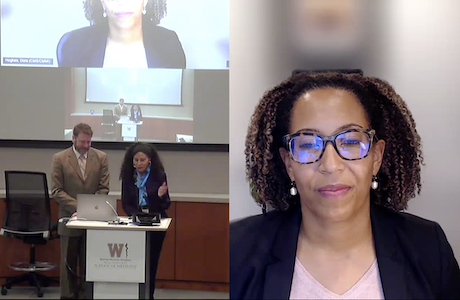
The WMed Class of 2025 learned how the service projects they do in medical school can impact the healthcare system as a whole at a December symposium.
At the Active Citizenship Symposium, held Dec. 6 and Dec. 8 at WMed’s W.E. Upjohn M.D. Campus, two national leaders in health care described how addressing social drivers of health can improve the American healthcare system.
Students had a chance to listen to Dora Hughes, MD, MPH, chief medical officer at the U.S. Department of Health and Human Services Center for Medicaid and Medicare Innovation, who spoke virtually via Microsoft Teams about her center’s efforts to improve health care by focusing on social drivers of health.
The center’s focus for the next 10 years is to create a health system that achieves equitable outcomes and focuses on five areas – driving accountable care, advancing health equity, supporting innovation, addressing affordability and partnering to transform the system, she said.
Dr. Hughes gave some examples of the center’s 30 accountable health communities across the United States that bridge clinical operations with social services to help the vulnerable population. The communities result in decreased emergency department use and are one of many models the CMS Innovation Center supports.
Over two years, the center estimated its services touched more than 28 million people and 500,000 providers, Dr. Hughes said.
There is a business case for health equity, especially with value-based payment models, to determine how organizations can improve health outcomes and reduce total costs of care, said Tim McNeill RN, MPH, the chief operating officer at Freedmen’s Health in Washington D.C.
“That absolutely requires looking at the most vulnerable persons that are in our population pool and really looking at what’s driving those outcomes,” he said, also speaking to the students virtually over Teams.
“It’s an incredible honor for our students to hear directly from some of the nation’s leaders in health innovation,” said Matt Longjohn, MD, MPH, an assistant professor in the medical school’s Department of Family and Community Medicine and faculty facilitator of the medical school’s Engagement and Discovery course. “The entire WMed community can take some pride in the fact that our innovative efforts to improve health care in Southwest Michigan is on the radar screens of folks like Dr. Hughes and Mr. McNeill,” he said. “We hope the involvement of these leaders in the Symposium will inspire our students to continue working in the community for years to come.”
Medical students in the Class of 2025 each contribute 45 hours of community service during the 15-month span of WMed’s Engagement and Discovery. Students start their service work during their first year at the medical school. They distribute meals, volunteer at COVID-19 vaccination clinics, support after-school and childcare programs for children of essential workers and work with elementary, middle and high school students as part of the Early Introduction to Health Careers pathway program, among other service learning.
In all, the Class of 2025 contributed more than 4,000 volunteer hours to local non-profit organizations to help address the most pressing health-related social needs facing Kalamazoo.
The Class of 2025 were tasked to explain how their community-based health improvement activities aimed to improve health equity, improve healthcare quality, diversify and stabilize the healthcare work force, drive down the costs of health care and transform health care to be more patient-centered.
“It’s been so wonderful to see our students put their hearts into the work in the community this year,” said Dr. Cheryl Dickson, the medical school’s associate dean for Health Equity and Chief Diversity Officer and director of the course. “Today’s medical students are obviously tomorrow’s doctors, and the forces shaping their future careers will require they know their way around community partnerships. This kind of student work was exceptionally difficult during the pandemic, and the re-emergence of opportunities for the students to demonstrate their commitment to community health has been welcome and inspiring to all of us.”
